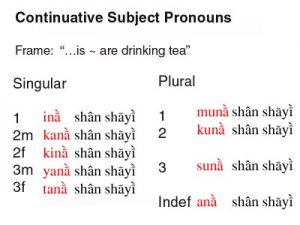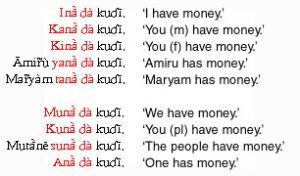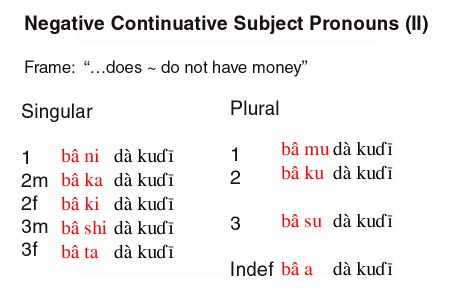Hausa Sentences Expressing “Have”
Hausa has no verb ‘have’. Hausa expresses the concept of “having” using the preposition da ‘with’ in a construction which might be translated “be with”.
Basic ‘have’ Sentences

Basic ‘have’ sentences use the continuative subject pronouns followed by da ‘with’ and the thing possessed. Below is the full paradigmwith kud’i ‘money’ as the thing possessed.

Negative ‘have’ Sentences
Negative ‘have’ sentences use a special set of negative continuative pronouns, with a falling tone ba followed by a high tone pronoun.

‘have’ Subject Questions: ‘Who has money?’

When the subject of a ‘have’ sentence is a question word, such as wa? ‘who?’ or me? ‘what?’,a set of relative continuative pronouns ending in –ke are required. The relative continuative pronouns of ‘have’ constructions resemble the relative continuative pronouns used with verbs, but those in ‘have’ constructions have a short vowel on the relative marker –ke, whereas those used with verbs have a long vowel.

‘have’ Object Questions: ‘What do you have?’
When questioning the object of a ‘have’ sentence, the question word me? ‘what?’ goes at the beginning of the sentence. This necessitates two changes from basic ‘have’ sentences:
- The the question takes the relative form of the pronoun, which ends in –ke (see just above, ‘have’ subject questions, for remarks on these pronouns).
- A “dummy” pronoun shi ‘it’ must follow the preposition da. This is because Hausa does not allow a preposition alone without some kind of object following it. Since the questioned “object” of ‘have’ is at the beginning of the sentence, something must take its place after da. Literally, therefore, one says in Hausa, “What do you have it?”

Emphasized Words in ‘have’ Sentences: ‘You have money.’ ‘Money is what you have.’
Emphasis of words in ‘have’ sentences follows the same general patterns as asking questions.
Subject
To show that a noun subject is emphasized, use the relative form of the pronoun ending in –ke. (See ‘have’ subject questions for further information on the form of subject pronouns.) This is sufficient to show emphasis, though you can add ne ‘it is (masculine)’ or ce ‘it is (feminine)’ after the noun.If a pronoun subject is emphasized, the independent pronoun precedes the relative subject pronoun. As with emphasized noun subjects, ne or ce may follow the pronoun.
| Amiru (ne) yake da fensir. Maryam (ce) take da sark’a.Kai (ne) kake da god’iya. Ke (ce) kike da zobe na zinariya. |
‘It’s Amiru who has a pencil.’ ‘It’s Maryam who has a necklace.’‘It’s you (m) who has a mare.’ ‘It’s you (f) who has a gold ring.’ |
Object
A ‘have’ sentence with an emphasized object is parallel to a ‘have’ sentence with questioned object (see ‘have’ object questions for amore detailed explanation):
- The emphasized word is at the beginning of the sentence and the sentence has the relative subject pronoun ending in –ke. Ne or ce may optionally follow the emphasized word.
- A “dummy” pronoun must follow the preposition da. The pronoun with be shi if the emphasized word is masculine singular, ita if it is feminine singular, su if it is plural.
| Fensir (ne) Amiru yake da shi. Sark’a (ce) Maryam take da ita.God’iya (ce) kake da ita. Zobe na zinariya (ne) kike da shi. |
‘It’s a pencil that Amiru has.’ ‘It’s a necklace that Maryam has.’‘It’s a mare that you (m) have.’ ‘It’s a gold ring that you (f) have.’ |
Omitting Pronoun Agreement
When a ‘have’ sentence has a subject other than a simple pronoun subject as in basic ‘have’ sentences, the pronoun part of the continuative pronoun may be omitted, leaving just the na of the continuative pronouns or the ke of the relative ‘have’ pronouns. This omission is possible for noun subjects of basic ‘have’ sentences and for emphasized subjects.
| Amiru na da kud’i. Maryam na da kud’i. Mutane na da kud’i.Amiru ke da fensir. Maryam ke da sark’a.Kai ke da god’iya. Ke ke da zobe na zinariya. |
‘Amiru has money.’ ‘Maryam has money.’ ‘The people have money.’‘It’s Amiru who has a pencil.’ ‘It’s Maryam who has a necklace.’‘It’s you (m) who has a mare.’ ‘It’s you (f) who has a gold ring.’ |
Expressing Qualities with ‘have’: ‘she is beautiful’, ‘the knife is sharp’

Hausa expresses some qualities using adjectives (see discussion of sentences with adjectives),but Hausa uses nouns to express most qualities. Thus, insteadof saying, “She is beautiful,” Hausa says, “Shehas beauty;” instead of saying, “the knife is sharp,”Hausa says, “The knife has sharpness.”
| Zainab tana da kyau. Wuk’a tana da kaifi. Jaki yana da k’arfi. Shinkafa tana da tsada. Kina da wayo. Ina da tsawo. |
‘Zainab is beautiful.’ ‘The knife is sharp.’ ‘The donkey is strong.’ ‘Rice is expensive.’ ‘You (f) are clever.’ ‘I am tall.’ |
= ‘Zainab has beauty.’ = ‘The knife has sharpness.’ = ‘The donkey has strength.’ = ‘Rice has expensiveness.’ = ‘You have cleverness.’ = ‘I have tallness.’ |

